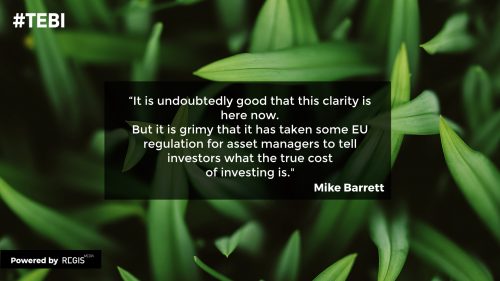It’s been a long time coming. But, after years of campaigning by my colleagues at the Transparency Task Force, by Gina and Alan Miller’s True and Fair Campaign and, of course, by The Evidence-Based Investor, UK consumers are finally being told the true cost of investing.
MiFID II, the European Union directive which came into force earlier this month, requires asset managers to disclose to investors all the fees and charges they pay. Hitherto, the big fund managers have talked about the annual management charge (AMC) as if that were all that investors pay. In fact, as TEBI readers know, those figures tell only part of the story. When you factor in all the other costs involved — particularly transaction costs — investors are paying far more than most of them ever realised.
Analysis just released by the Edinburgh-based asset management consultancy, The Lang Cat, shows that once transaction costs are included many investors pay almost double the ongoing charge figure (OCF) in the UK’s most popular funds. This can go up to four times the OCF, if you include platform charges and performance fees.
By way of example, the Janus Henderson UK Absolute Return fund has an OCF of 1.06%, and transaction costs of 0.79%. If platform fees and a performance fee are charged, the total cost of investing jumps to an average of 3.82%. In other words, investors in that fund need it to outperform the market by 382 basis points a year just to cover their costs. That’s a huge hurdle for any fund manager to overcome.
Even Vanguard, which has done more than any other company to drive costs down, has admitted that some of its funds double in price when transaction costs are levied, and quadruple once its platform fee is also factored in.
For me, there’s a strangely bittersweet feeling at seeing these figures finally revealed in black and white. To quote Vanguard’s Nick Blake in the FT, “if this disclosure can help clients get more accurate numbers and make it easier for them to make investment decisions, that can only be a good thing.”
But there are several reasons why UK investors should feel justifiably angry about all this. Why, for example, have we had had to wait quite so long just to find out how much we pay?
Some media outlets are covering this story as if these fees and charges have come as a shock. The truth is that asset managers have been getting away with smoke and mirrors for decades. If more journalists — and for that matter, financial advisers and other investment professionals — had asked more searching questions over the last 30 years, the average UK investor would be in a far better position today than they actually are.
Consumers should also feel let down by successive UK regulators. The lack of transparency around asset management costs has been known for many years. Why then, has it taken a European Union directive to force the industry to do the decent thing?
The Lang Cat’s Mike Barrett sums it up when he says: “It is undoubtedly good that this clarity is here now. But it is grimy that it has taken some EU regulation for asset managers to tell investors what the true cost of investing is. You have always been paying these fees, but now the fund groups have the good grace to tell you these costs upfront.”
But it gets worse. For years the industry has denied there was an issue at all. 18 months ago, for instance, the Investment Association, the UK trade body for asset managers, released a study claiming there was “zero evidence” of hidden fees and charges.
Even now, we’re told, several major fund houses and product distributors are refusing to co-operate fully with the new regulations. The FT, for example, has named Aegon, Fidelity, Aviva and Axa as examples of firms that have failed to provide the newspaper with the relevant information.
So, what happens now? I have two predictions. The first is that the fund industry will continue to drag its feet as much as it can — delaying full disclosure until it’s simply no longer able to resist. My second prediction is that, as and when other fund managers gradually start to disclose the true cost of investing in their products, we’re going to see some truly shocking revelations.
As a late-twentieth-century US President may have put it, if you thought these latest figures looked bad, you an’t see nothin’ yet.
ROBIN POWELL is the founder and editor of The Evidence-Based Investor. A freelance journalist, he runs Regis Media, a specialist content marketing consultancy for financial advice firms around the world. You can follow him on Twitter and on LinkedIn.
The Evidence-Based Investor is produced by Regis Media, a boutique provider of content and social media management to financial advice firms around the world. For more information, visit our website and YouTube channel, or email Sam Willet or Christina Waider.
How can TEBI help you?










